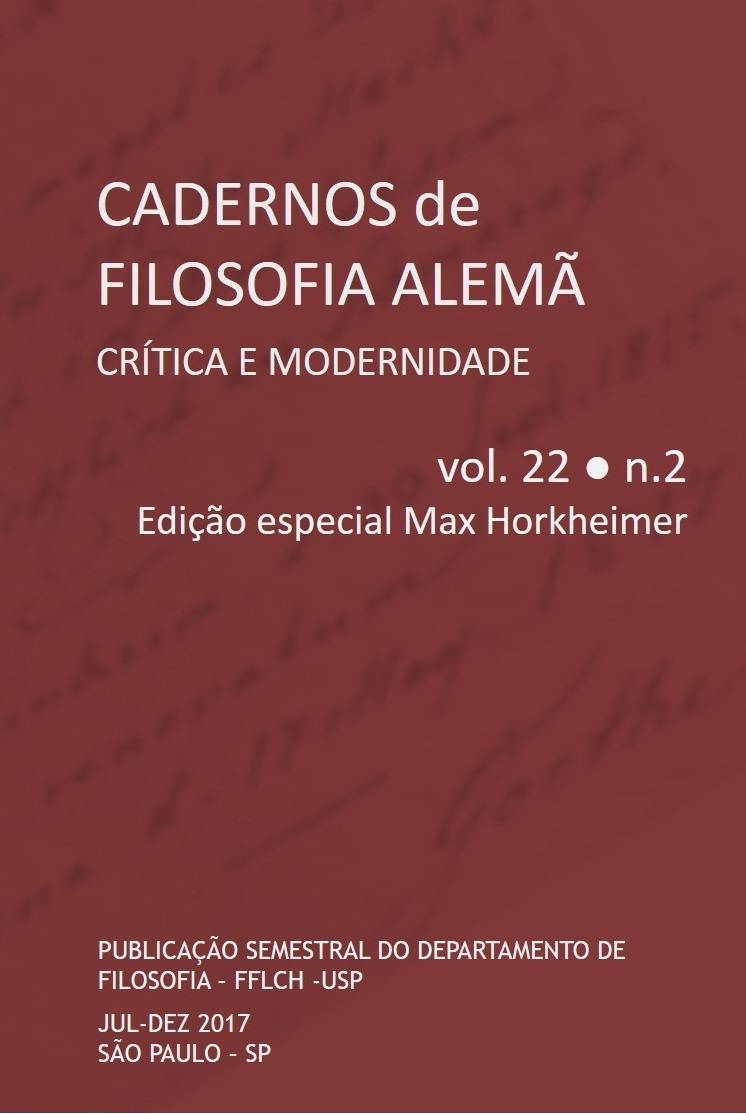Rethinking the sociological deficit of critical theory: from Honneth to Horkheimer
DOI:
https://doi.org/10.11606/issn.2318-9800.v22i2p63-76Keywords:
critical theory, social research, Horkheimer, Honneth, recognition theoryAbstract
With the well-known critique of “sociological deficit”, Honneth pointed out Horkheimer's inability to carry out the main program of critical theory, namely, to link social philosophy with an analysis of society that was also based on empirical social research. However, because he distanced himself from the paradigm of “struggle” and developed a theory more concerned with the “normative reconstruction” of the institutions of our democratic life, Honneth would end up paying less attention to the relation with social research. We argue that Horkheimer's works of the decade of 1930 could indirectly help us to solve some methodological difficulties concerning a kind of “new sociological deficit” that critical theory would be facing today.Downloads
References
Abromeit, J. (2011). Max Horkheimer and the Foundations of the Frankfurt School. Cambridge: Cambridge University Press.
Habermas, J. (2015). “Max Horkheimer: Sobre a história de desenvolvimento de sua obra”. In: Textos e contextos. São Paulo: UNESP.
____________. (2016). Para a reconstrução do materialismo histórico. São Paulo: UNESP.
Honneth, A. (1989). Kritik der Macht. Frankfurt am Main: Suhrkamp.
____________. (1990). “Kritische Theorie. Vom Zentrum zur Peripherie einer Denktradition”. In: Honneth, A. Die zerrissene Welt des Sozialen. Frankfurt am Main: Suhrkamp.
____________. (2000). “Die Soziale Dynamik von Miβachtung: Zur Ortbestimmung einer kritischen Geselschaftstheorie”. In: Das Andere der Gerechtigkeit. Frankfurt am Main: Suhrkamp.
____________. (2003). Luta por reconhecimento: A gramática moral dos conflitos sociais. São Paulo: Editora 34.
Honneth, A. e Hartmann, M. (2010). “Paradoxien der kapitalistischen Modernisiserung. Eine Untersuchungsprogramm”. In: Honneth, A. Das Ich im Wir. Berlin: Suhrkamp.
Honneth, A., Lindemann, O. e Voswinkel, S. (2013). (orgs.). Strukturwandel der Anerkennung: Paradoxien sozialer Integration in der Gegenwart. Frankfurt am Main: Campus.
Horkheimer, M. (2009a). “Die gegenwärtige Lage der Sozialphilosophie und die Aufgaben eines Instituts für Sozialforschung”. In: Gesammelte Schriften. Bd. 3. Frankfurt am Main: Fischer.
________. (2009b). “Traditionelle und kritische Theorie”. In: Gesammelte Schriften. Bd. 4. Frankfurt am Main: Fischer.
____________. (2009c). “Vorwort [zu Heft ½ des I. Jahrgangs der Zeitschrift für Sozialforschung]”. In: Gesammelte Schriften. Bd. 3. Frankfurt am Main: Fischer.
Melo, R. (2014). Da teoria à práxis? Axel Honneth e as lutas por reconhecimento na teoria política contemporânea. Revista brasileira de ciência política, 15, pp.17-36.
Nobre, M. (2013). “Reconstrução em dois níveis: Um aspecto do modelo crítico de Axel Honneth”. In: Melo, R. (org.). A teoria crítica de Axel Honneth: Reconhecimento, liberdade e crítica. São Paulo: Saraiva.
____________. (2008). “Teoria crítica hoje”. In: Melo, R., Repa, L., Keinert et al. (org.). Tensões e passagens: Filosofia crítica e modernidade. São Paulo: Esfera Pública.
O’Neill, S. e Smith, N. (org.). (2012). Recognition theory as social research: Investigating the dynamics of social conflict. New York: Palgrave Macmillan.
Voirol, Olivier. (2012). Teoria crítica e pesquisa social: Da dialética à reconstrução. Novos Estudos CEBRAP, 93, pp.81-99.
____________. (2013). “Filosofia social e pesquisa social: O ‘problema hegeliano’ de Max Horkheimer e Axel Honneth”. In: Melo, R. (org.). A teoria crítica de Axel Honneth: Reconhecimento, liberdade e crítica. São Paulo: Saraiva.
Downloads
Published
Issue
Section
License
Information and conceptions on the texts are complete responsibility of the authors.
All the articles submitted before July 5th 2018 and those published after July 2021 are licensed under a CC BY-NC-ND license – except those published between the aforementioned dates, which are under the CC BY-NC-SA license. The permission for the translation of the material published under the license CC BY-NC-ND by third parts can be obtained with the consent of the author.
Open access policies - Diadorim
Rules applied before July 5th 2018:
Presenting a submission to our Editorial Board implies granting priority of publication for “Cadernos de filosofia alemã”, as well as transferring the copyright of texts (once published), which will be reproduced only with the manifest authorization of the editors. Authors keep the right to reuse the texts published in future editions of their work, without paying any fees to "Cadernos”. We will not grant the permission to re-edit or translate the texts for third parts without agreement of the author.


